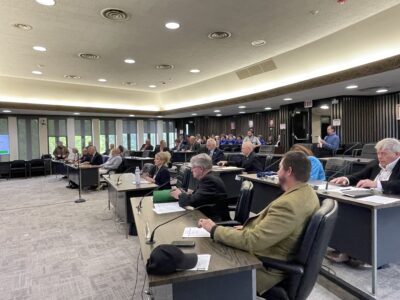Retired Leaders Remember Seymour’s Mayoral Tenure

Carolyn Gifford Seymour addresses supporters after becoming the first woman to be elected as the city of Jamestown’s mayor in November of 1991. P-J file photo
In the infancy of her historic mayoral tenure, Carolyn Gifford Seymour made one thing clear to the city of Jamestown’s then-sitting development director Sam Teresi — her intention to nominate someone else to his position.
“She came out and told me, in no uncertain terms, that she had thought I was way too young at the time, at the age of 31, and didn’t have enough experience and that she was moving in another direction,” said Teresi, who at the time was three years into that position — the precursor to his own two-decade tenure as the city’s chief executive that concluded at the end of last year.
“Ultimately she and the city council came to a determination to retain me as director of development,” he noted on Seymour. “But, after that rocky start, we came to work pretty effectively with each other.”
Seymour, the cerebral former small business owner and tireless community advocate who broke barriers as the first woman to serve as the city’s mayor, passed away on Saturday at the age of 81 at Salamanca Rehabilitation and Nursing Center.
A native of Rochester, graduate of Houghton College and recipient of a doctorate in linguistics from the University of Wisconsin-Madison, she relocated to Jamestown in 1972 after an early career as an assistant professor of linguistics at Case Western Reserve University in Cleveland, Ohio.
Upon moving to the city, she was hired as executive assistant to then-mayor Stanley N. Lundine, whose “blue ribbon ticket” marked a new era in city government. When reached on Tuesday, Lundine was saddened to hear of Seymour’s passing.
“She was truly a person of very high principles, someone who was very intelligent and very committed to progressive ideals,” said Lundine, who was elected to Congress in 1976. “She was still my assistant in when I was elected to Congress and I asked her if she wanted to be on my congressional staff and she said that she wanted to remain with the city.”
After additional work as owner and operator of The Bookshop in downtown Jamestown with a location in Warren, she challenged the local Democratic Party’s endorsed mayoral candidate, Jeff Nelson, to a primary in a bid to unseat incumbent mayor Donald W. Ahlstrom in 1991, defeating Ahlstrom by a slim margin in the general election.
Her upset victories both came weeks after the confirmation hearings of Supreme Court Justice Clarence Thomas that featured stirring testimony from Anita Hill, a college professor and former colleague of Thomas’ who accused him of inappropriate conduct. The Thomas hearings and the lack of female representation in elected offices led to a surge in women candidates in the early 1990s.
“She was the insurgent coming in from the outside and actually won,” Teresi said, calling Seymour “one of the most intelligent people to have served in that office,” while acknowledging the period in history that helped bring her there.
“(The Thomas hearings) may not have been the cause for her success, but she was incredible and she had a bump and a boost because a lot of voters saw the historical nature of this in an era where women’s issues were coming of age in many respects politically,” he said.
But Seymour, like many of the politicians of that time, fell victim to political infighting that dominated that era of city history, said Teresi, who refers to the 1990s as the “Lost Decade.”
“There was such a high level of political strife at the point in time,” he said. “It was coming from all directions and from all parties and it was a difficult working environment for whoever was the mayor. Carolyn had to deal with a lot and overcame a lot during her brief tenure. I give her a lot of props as I do to her other colleagues of that era for working during a very difficult and almost toxic political period in the city’s history.”
The mayoral term length — at the time only two years — was a major factor, Teresi said.
“It was terrible having a two-year term,” he said. “The mayor was constantly running for re-election, raising funds and didn’t really, at the executive branch level, have enough of an opportunity to take a longer-term approach to things and a better approach to things.”
Lundine, who again encountered Seymour during his career as the state’s lieutenant governor, agreed.
“If she had been given four years to prove herself, the result might have been quite different,” Lundine said. “Her political skills might not have been great as her intellectual capacity, but she really was largely a victim of the time.”
In a turn of events, Seymour, herself, was defeated in the 1993 Democratic Primary by James Tumminia and forged an ill-fated write-in campaign, with both falling to longtime Republican councilman Richard Kimball.
“She ran a very spirited and vigorous write-in campaign and did extremely well for herself on that,” Teresi said. “I think she garnered close to 1,000 votes on a write-in campaign which is unbelievable.”
However, a unique scenario appeared during the campaign: after the Jamestown Expos baseball franchise relocated to Burlington, Vermont, Robert and Mindy Rich of Buffalo expressed interest in relocating their Niagara Falls franchise to the city.
Fearing that the debate over the franchise would become a political “baseball” among the three candidates ahead of the November election, all three met in city hall with representatives from the Rich organization to make sure each were on the same page.
“Carolyn took the lead at the meeting, as she should of as the sitting mayor and basically said, ‘You have my word, I’m all in favor of this,'” Teresi said. “The interesting thing about it was, she was an individual that could care less about baseball — sports in general and baseball in particular — but she had enough knowledge of the community and what was good with the community and what was important to the community and it didn’t have to be something that interested her individually.”
He added, “She knew this was good for the city and it was important to the city and she stepped up and took the lead and said, ‘As the mayor, you have my word: in this election, I will do nothing but support this deal.’ She turned to Dick and to Jim and said, ‘Gentlemen, do we agree on this?’ and they both said, ‘Absolutely.’ All three of them held to their word during the campaign and within days, the city council was approving a lease and Carolyn was signing a lease for the ball club to move to Jamestown.”
The most revealing part of the meeting to Teresi, however, was what came next.
“Carolyn’s last words at the meeting were, ‘Sam is the point person on this. … When you’re speaking to Sam, you’re speaking to me,'” Teresi remembered. “That was pretty significant to me at the time, going from just a year-and-a-half earlier in which I was clearly not her choice as director of development to toward the end of her administration when she was saying, ‘I’m delegating this all to Sam, he’s running point on this and whatever he says goes.'”
Even during his own administration, Teresi continued to turn to Seymour for counsel.
“There’s only a handful of us in the town at any given time and I think that we came to grow to understand and respect and enjoy each other’s company throughout my tenure,” he said. “We’d see each other out in public and we developed a very good relationship and I had the opportunity to call upon her from a few occasions, seeking the thoughts, the inputs and the advice that only a former mayor could share from her perspective sitting behind Jamestown’s version of the Resolute Desk.”
One thing to him, however, was clear.
“She had a deep and abiding passion for her adopted city,” he added.




